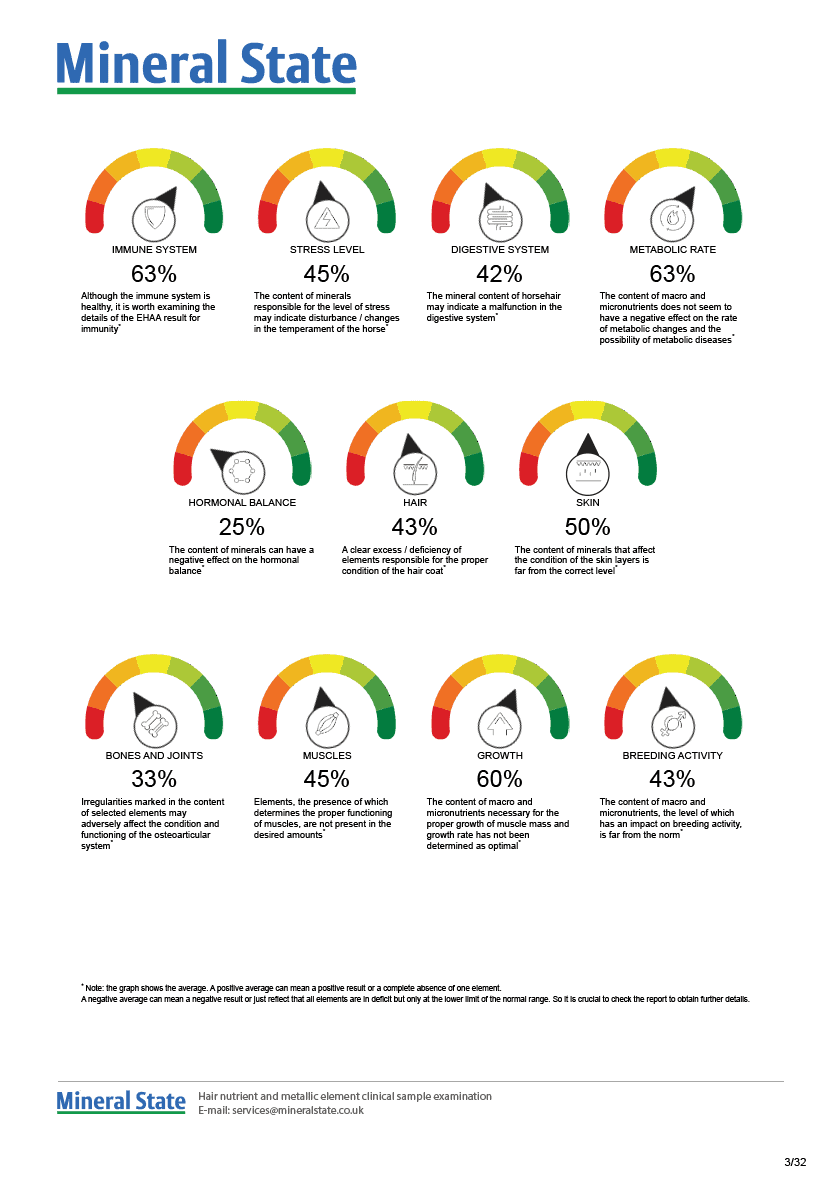Horse Hair Testing – Comprehensive Elemental Hair Analysis
Our Horse Elemental Hair Analysis screens for 24 elements, including essential minerals, trace elements, and toxic heavy metals. By analysing a simple mane or tail hair sample, the test provides a detailed biochemical profile of your horse, covering:
- Mineral ratios and balance
- Metabolic efficiency and energy levels
- Hormonal and adrenal health
- Immune and digestive system function
- Bone, joint, muscle, skin, and coat condition
- Stress resilience and behaviour
- Fertility, breeding activity, and foal development
| Horse Hair Testing Details for Ordering | |
|---|---|
| Test | Horse Hair Analysis |
| Laboratory | Lifeline Diag. |
| Price | £95.00 |
| Sample type | Hair |
We were often asked, "Do you know where I can find the location of an equine nutritionist test can you tell me where I should go"? Therefore, we decided to add this test for horse owners, managers and vets in the UK.
This test can help you understand your horse's nutrition requirements and may be useful for trainers or buyers who wish to learn about the biochemical profile of their horses and if they are lacking any nutrients such as selenium, calcium and magnesium supplements for horses for example.
Tissue mineral testing of a horse's hair can aid in measuring mineral retention; it may also help to determine the best supplements for feeds (if required) and more importantly, what is not required in order to avoid nutritionally induced deficiencies or imbalances and digestive problems.
The analysis test is easy to conduct with full instructions include and free return address envelope.
Understanding your horse's biochemistry
The report is extensive (typically 30+ pages) and includes detailed charts with clear explanations of how each mineral imbalance or toxic element may affect your horse’s performance, recovery, behaviour, and long-term health.
Toxic elements tested for include: aluminium, arsenic, cadmium, lead, mercury, barium, vanadium, and nickel. These heavy metals can reduce stamina, disrupt hormonal balance, and impair fertility or growth.
Beneficial minerals tested for include: calcium, magnesium, phosphorus, sulphur, sodium, potassium, zinc, copper, iron, manganese, selenium, cobalt, chromium, and silicon. These are vital for musculoskeletal strength, coat condition, digestion, energy metabolism, reproduction, and overall resilience.
Additional trace elements such as lithium, germanium, and strontium are also measured to ensure a full overview of your horse’s mineral status.
Elemental Hair Analysis is a powerful tool for owners, trainers, and breeders. It helps optimise nutrition, supports training and recovery, and reduces the risks of deficiencies or toxic exposures that may affect fertility, breeding outcomes, and foal health.
Your horse’s results will be sent to you by email as a detailed PDF report. Please see the sample report for a complete example of the insights available.
Don't forget to download this PDF to view the sample hair analysis report for horses.

After the test is complete, the results will be returned to you via email as an attached .pdf, as above. If you wish to receive a printed copy, please contact us.
Toxic elements tested for
| Element Name | Element Symbol |
|---|---|
| Mercury | Hg |
| Beryllium | Be |
| Uranium | U |
| Cadmium | Cd |
| Aluminium | Al |
| Arsenic | As |
| Lead | Pb |
Elements listed above are toxic these "heavy metals" can interfere with a horse's normal biological processes and biochemical functions. Because they are present in the environment, they are present in all biological systems.
They are poisonous to horses, ideally they should not be present in their bodies in any quantity as they are injurious to health, excretion of them if found is advised to avoid bioaccumulation, either by detoxing or through a change of diet or vitamins and minerals supplementation.
Beneficial minerals tested for
| Element Name | Element Symbol |
|---|---|
| Calcium | Ca |
| Phosphorus | P |
| Selenium | Se |
| Sulphur | S |
| Magnesium | Mg |
| Iron | Fe |
| Boron | B |
| Potassium | K |
| Sodium | Na |
| Manganese | Mn |
| Cobalt | Co |
| Copper | Cu |
| Chromium | Cr |
| Molybdenum | Mo |
| Zinc | Zn |
Elements listed above are required by the horses to reach optimum performance levels; they have been widely studied and are known to essential for many biological functions within horses.
They play a part in many functions including the endocrine system, muscular activity, maintaining the integrity of the skeleton and joints, reproduction and overall development. They must be replenished through feeds or vitamins and minerals supplementation.
Additional elements tested for
| Element Name | Element Symbol |
|---|---|
| Germanium | Ge |
| Lithium | Li |
| Vanadium | V |
| Tungsten | W |
| Barium | Be |
| Nickel | Ni |
| Strontium | Sr |
| Zirconium | Zr |
| Platinum | Pt |
| Tin | Sn |
Additional elements listed above are thought to be of benefit to equine health, research is ongoing as to the correct amounts required and their potential benefits, they are obtained either through feeds or vitamins and minerals supplementation.
